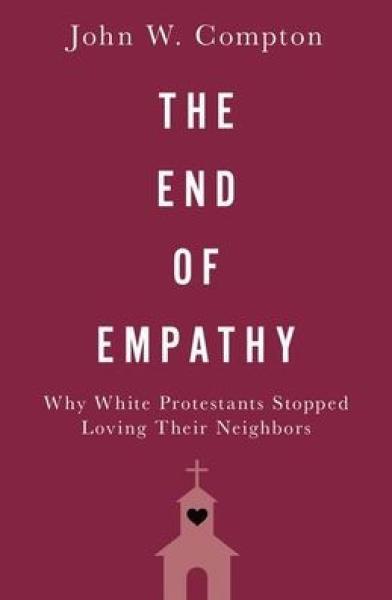Description
In The End of Empathy, John W. Compton presents a nuanced portrait of the changing values of evangelical voters over the course of the last century. To explain the rise of white Protestant social concern in the latter part of the nineteenth century and its sudden demise at the end of the twentieth, Compton argues that religious conviction, by itself, is rarely sufficient to motivate empathetic political behavior. When believers do act empathetically--championing reforms that transfer resources or political influence to less privileged groups within society, for example--it is typically because strong religious institutions have compelled them to do so.
Citizens throughout the previous century had sought membership in churches as a means of ensuring upward mobility, but a deterioration of mainline Protestant authority that started in the 1960s led large groups of white suburbanites to shift away from the mainline Protestant churches. There to pick up the slack were larger evangelical congregations with conservative leaders who discouraged attempts by the government to promote a more equitable distribution of wealth and political authority. That shift, Compton argues, explains the larger revolution in white Protestantism that brought us to this political moment.
"The End of Empathy develops a theoretical framework capable of explaining both the rise of white Protestant social concern in the latter part of the nineteenth century and its sudden demise at the end of the twentieth. The theory proceeds from the premise that religious conviction, by itself, is rarely sufficient to motivate empathetic political behavior. When believers do act empathetically - for example, by championing reforms that transfer resources or political influence to less privileged groups within society - it is typically because strong religious institutions have compelled them to do so. For much of American history, mainline Protestant church membership functioned as an important marker of social status - one that few upwardly mobile citizens could afford to go without. The socioeconomic significance of membership, in turn, endowed Protestant leaders with considerable authority over the beliefs and actions of their congregations. At key junctures in U.S. history - the Progressive Era, the New Deal, the civil rights movement - the nation's informal Protestant establishment used this authority to mobilize rank-and-file churchgoers on behalf of government programs that increased economic opportunity and promoted civic inclusion. When this pattern of religious authority collapsed in the late 1960s - thanks to a confluence of trends in the labor market, higher education, and residential mobility - it produced a large population of white suburbanites who had little reason to seek out mainline Protestant churches or heed their advice on the burning social questions of the day. The churches that flourished in the new age of personal autonomy were those that preached against attempts by government to promote a more equitable distribution of wealth and political authority"--
Why are white evangelicals so supportive of Donald Trump, when in the past evangelicals were often on the side of progressive social reforms? Many have attempted to answer that question by looking only to the present. In this book John Compton takes a longer view, convincingly arguing that the Religious Right emerged to fill the vacuum left when mainline Protestantism lost its authoritative voice in American public life. This book is required reading for anyone trying to make sense of the contemporary American religious landscape. -- David Campbell, Packey J. Dee Professor of American Democracy, University of Notre Dame
As a former pastor who spent my life in the milieu described in John Compton's new book, I read with it with both personal and professional interest. Well-written and energetically researched, The End of Empathy overturned several of my previously settled assumptions, and forced me to see many of my own struggles and perplexities in a new light. Most importantly, it convinced me that evangelical leaders of the Religious Right have not actually been religious leaders; rather, they have been social mirrors, following their white flocks into a form of backlash politics that reflects their racial anxieties and resentments. An important book, especially in this conflicted time. -- Brian D. McLaren, author of The Great Spiritual Migration
In this compelling contemporary history, John Compton marshals a wide range of evidence to argue that it is the decline, not the enhanced influence, of religious authority in their day-to-day lives that drives racial resentment and other conservative political characteristics associated with white evangelicals today. -- Janelle Wong author of Immigrants, Evangelicals, and Politics in an Era of Demographic Change
A comprehensive, balanced, and insightful review of the liberal American Protestant story.--Kirkus
Compton has written a...nuanced historical study on the loss of Protestant social influence in America.... [He argues that] the waning of [religious] authority in the 1960s and 1970s under such forces as individualism and suburbanization...led to the loss of a distinctly religious politics and the emergence of a situation where it is increasingly politics that determines religion rather than the other way around. --Religion Watch
The End of Empathy will become an immediate classic in American political and religious history. [It] unearths a mountain of empirical data to support some of the darker truths that many liberals have been reluctant to accept about the rightward trend of American Protestant and evangelical institutions. --Los Angeles Review of Books
Product Details
- Oxford University Press, Brand
- Aug 3, 2020 Pub Date:
- 019006918X ISBN-10:
- 9780190069186 ISBN-13:
- 408 Pages
- 9.3 in * 6.3 in * 1.4 in Dimensions:
- 2 lb Weight:




